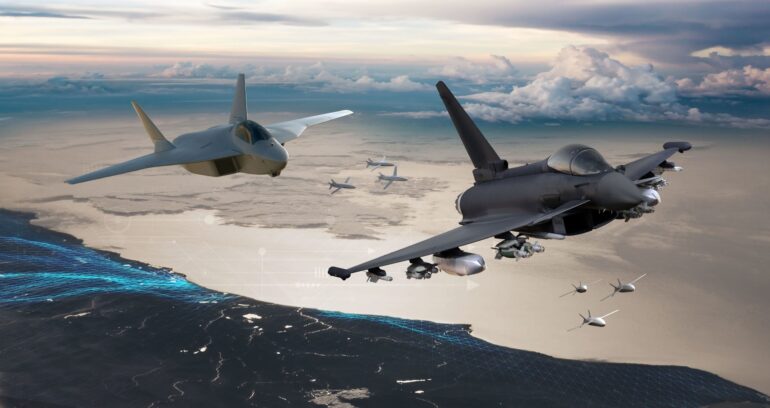TL;DR:
- Germany selects HIS consortium for AI integration in FCAS fighter jet.
- Consortium comprises Helsing, SSE (Rohde & Schwarz subsidiary), and IBM Deutschland.
- BAAINBw signed contract for AI platform on August 7, aligning with the national research project.
- Cross-functional platform developed for swift AI capability deployment.
- AI backbone is crucial for the air force’s multifunctional capabilities.
- IBM’s Secure Cloud ensures scalable, secure AI application development.
- HIS AI backbone enhances military applications, collaboration, and armed forces deployment.
- FCAS aircraft mock-up unveiled, with €4 billion investment by 2025 for the program.
- FCAS aims for operational status by 2040.
Main AI News:
The Federal Office of Bundeswehr Equipment, Information Technology, and In-Service Support (BAAINBw) in Germany has taken a significant stride in modernizing its defense capabilities. The prestigious HIS consortium, composed of Helsing, Schönhofer Sales and Engineering (SSE), a subsidiary of Rohde & Schwarz, and IBM Deutschland, has been meticulously chosen to spearhead the incorporation of cutting-edge artificial intelligence infrastructure into the Future Combat Air System (FCAS).
On the 7th of August, BAAINBw inked a transformative contract, effectively engaging the prowess of the HIS consortium. This pivotal move echoes the urgency and commitment towards fortifying Germany’s defense landscape. Moreover, it aligns seamlessly with the Next Generation Weapon System National Research and Technology initiative – a germane national endeavor running in parallel with the broader Franco-German-Spanish FCAS program.
Swift and agile development of this pivotal AI capability has been prioritized by Germany. A unified cross-functional platform has been meticulously crafted to serve as an encompassing developmental habitat for all facets of FCAS. This strategic maneuver inherently underscores Germany’s resolute dedication to fostering a harmonious synergy among its diverse partners and pillars in the journey toward FCAS’ fruition.
Stephanie Lingemann, the esteemed Program Director at Helsing, elucidates, “AI assumes a pivotal role in navigating conflicts against adversaries of commensurate strength. The AI backbone stands as the inaugural stride towards bequeathing the Air Force with multifaceted AI capabilities. While commendable progress characterizes the FCAS program, the establishment of such a robust infrastructure is quintessential for the entire spectrum of platforms.”
Sandra Pfetzing-Huber, an Associate Partner at IBM Consulting, further reinforces the significance of robust infrastructure. She articulates, “The development and operationalization of AI applications hinge upon an infrastructure that amalgamates power, scalability, and security. IBM’s Secure Cloud (VS-Cloud), in conjunction with partners Secunet and RedHat, manifests the ideal confluence of scalability, flexibility, dependability, and security. This synergy expedites the development, operation, and fortification of AI applications.”
The HIS consortium’s AI backbone stands poised to usher in a new era of high-performance AI. This technological marvel will traverse the realm of military applications, inclusive of intricate industrial collaboration, culminating in deployment to the German armed forces. The implications of this advancement are profound, bolstering Germany’s prowess on the global stage.
As progress surges forward, the unveiling of an FCAS aircraft mock-up at the Paris Air Show in June 2019 stands emblematic of tangible strides. With France and Germany collectively earmarking an initial €4 billion ($4.5 billion) towards developmental pursuits by 2025, Berlin’s share in this initiative is poised to be significant. A prospective operational status for FCAS is anticipated by 2040.
Conclusion:
The integration of advanced AI technology into Germany’s FCAS fighter jet through the HIS consortium marks a significant step toward enhancing national defense capabilities. The collaborative effort among key partners and the development of a cross-functional platform reflect Germany’s commitment to technological innovation. This strategic move is poised to drive advancements not only in defense but also in the broader market for AI integration in aerospace and military sectors.

